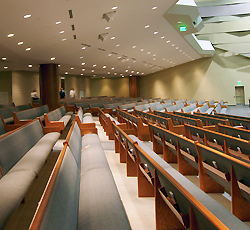
Avoiding A Wrong Turn
The best way to prevent this dilemma is to not travel down the design road without a qualified acoustical consultant – someone who can directly participate in room size and shaping issues along with the architect.
In fact, it’s a good idea to select the entire design team before any design work takes place. That way, other team members whose work impacts the basic design (such as structural, civil, and mechanical engineers, etc.) can address issues before a great deal of effort and money are spent on the project. The acoustical consultant’s involvement is crucial in this initial process.
While it may be too late to hire an acoustical consultant for the start of a project, it’s never too late to involve one in later stages. Depending on the amount of design work completed, there may be a need to scrap some aspects of the room design—or even scrap the whole design and start over.
Although the prospect of throwing fees away for a design that doesn’t work is not pleasant, it’s better to throw out a bad room design now than to build a room that doesn’t work.
The bottom line is that if you end up with a poorly-designed room, you’ll soon be asking yourself why you have a problem and what to do to fix it. Unfortunately, this happens all the time.
Choosing An Acoustical Consultant
First, resist the temptation to hire the first consultant you meet. An old medical school joke illustrates this point. One person asks, “What do they call the guy who finishes last in his medical school class?” The other answers, “Doctor!”
The point is that there are some good consultants—and there are some who are not so good. Selecting a qualified acoustical consultant is as important as selecting a good architect, and the selection process is not an easy one.
However, there are several basic guidelines for evaluating prospective consultants during the selection process.
• Check references. Call churches with which the consultant has worked on previous projects and ask the staff if they would do it all over again.
• Check out the systems and the rooms that your prospective consultant has worked on. There is nothing like experiencing rooms that he has worked on first-hand to help determine if you should hire him. You wouldn’t go out and buy most things sight unseen, especially a multi-million dollar church building. The same applies to your acoustical consultant.
• Make sure the acoustical consultant (and architect, for that matter) understand your ministry goals and program. If they don’t, they will have difficulty designing a facility that works as a tool to meet those goals.
• Finally, make sure you have a good working rapport with the consultant, and make sure the consultant is able to work well with the rest of the design team.
By following these basic guidelines (and with a little luck and a lot of prayer), you can assemble a good design team that will develop a functional and effective facility.
